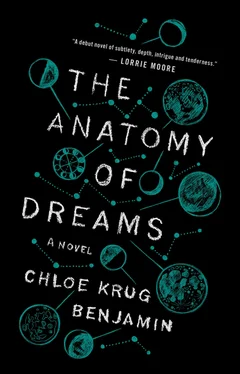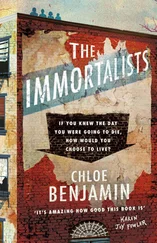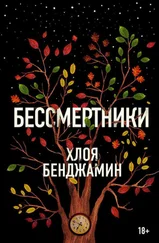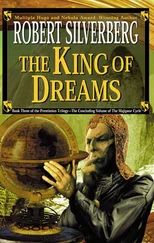“Got caught in the rain,” he said, leaning against the screen. “I was picking up laundry. I’ll just take a moment—my arms need a rest. Not working today?”
“We had a lab last night, so I’m working from home.”
“Nice job.”
He lifted his head and grinned. His eyes were bright and owl-like behind the thick rims of his glasses, and his bangs were slicked to his forehead.
“And what are you doing today,” I asked, “besides laundry?”
“I teach a freshman composition course in the evening. And I’ll work on my dissertation.”
He hoisted one of the bags of laundry up on his back and straightened, tilting his head toward the door.
“Why don’t you come with? You can help me carry the laundry, have something to eat at our place. More fun than sleeping, I’d hope.”
“That sounds like free labor.” I grinned. “What’s in it for me?”
“The pure and stirring pleasure,” said Thom, “of hearing about my dissertation. Lots of people vying to hear more about this project, you know. It’s sure to make me a very attractive job candidate.”
Now I almost felt sorry for him. “What time is it?”
“Noonish.” Thom shook his shirtsleeve back and checked his watch. “Quarter after.”
I craned my head to look in the kitchen, but Gabe still hadn’t come downstairs. I wondered what he would think if he woke up while I was next door, but I wasn’t doing anything wrong. Besides, it would be nice to spend time with another person. So I took one of the bundles and followed Thom from my front porch to his, where hanging chimes made frantic, high-pitched music in the wind.
“Is Janna home?” I asked as we crossed through the kitchen. I hadn’t been to other parts of their house before, but now I saw it was the mirror image of the one I shared with Gabe—the rooms were identically shaped but laid out in opposite formation. In the living room, there were two wooden rocking chairs, a low table stacked with books, and an oval-shaped rug, knit in spiraling shades of pastel yarn. In front of a boarded-up fireplace, someone had set a row of candles on a tray. Along the wall were stencils in colored pencil, framed behind glass. The images were abstract, and they seemed to have been drawn in a quick, jittery hand; the thin lines had a sense of impulse and movement, and I had a strange feeling that the walls were quivering.
“She’s at work,” said Thom. “She has a new pair of clients, filthy rich, who founded some sort of artists’ colony in the Driftless Area. Janna takes care of the grounds, so I take care of the laundry.”
We set the laundry bags, the sort of drawstring sacks that may have once held a tent or a sleeping bag, down on the floor. They wavered, tubular and soft-bodied as dummies, before tipping over. A piece of Janna’s underwear, silky and magenta, sprouted from the mouth of the bag I’d carried.
I took a seat in the smaller rocking chair and crossed my legs on its salmon-colored cushion. In the wall closest to me was a small door that our apartment didn’t have.
“Where does that door lead?”
“The basement,” said Thom, sitting down.
“Funny,” I said. “You have a basement, and we have an attic.”
Our attic was a small, cobwebby space accessible only by way of a rickety staircase. Probably it could have been an airy haven of some sort, if we’d put time into cleaning it, but we’d opted to use it for storage. There were piles of canvases and paints, boxes filled with winter clothing and Christmas ornaments.
“It’s where I go to write,” said Thom. “Clears my head to be underground. Nothing to look at, nothing to hear.”
“It isn’t depressing?”
Thom extended his legs and crossed one over the other. He wore a ragged sweater over a starched button-up shirt and a pair of beige slacks, which rode up around his ankles to reveal bones both large and delicate. His legs had the awkward grace of a giraffe, an unwieldy nobility, which made me want to pause in deference as he arranged himself.
“Depressing?” he asked. “It can be, but it also has the opposite effect. Sometimes I have to go to a place where there’s nothing to look at in order to see clearly. The more attractive the outside world, the more difficult it is for me to retreat into my head.”
“And what do you do there? What’s your book about?”
“Keats,” he said. “The poet who wrote the piece I quoted the other night—‘yes, in spite of all, some shape of beauty . . .’ You remember? He died at twenty-five, but he got more done in those years than most of us could hope to do by eighty. Keats was obsessed with beauty, thought it was the highest form of truth—he was a Romantic, so we can’t blame him—and he rejected the rationalism that was taking hold at the time. Other artists tried to analyze the world, pin it down like a butterfly staked to a board, but old Johnny just wanted to stare. He got itchy around people like Coleridge, who sought knowledge over beauty—people who were incapable, as Keats put it, of being content with half knowledge. In 1817, he wrote to his brothers about it, and he came up with this phrase called negative capability .”
“Negative capability?”
“‘When man is capable of being in uncertainties. Mysteries, doubts, without any irritable reaching after fact and reason’—his words, not mine. What I want to figure out is how this not knowing can be productive—how it isn’t a purely negative capability after all.”
“But isn’t that the point? That it isn’t productive?”
“That’s certainly the point a lot of people are making,” said Thom. “Most of them are economists or scientists, some of them are educators, and plenty of them are ordinary, practically-minded people. People who chase facts like they’re drilling for oil. People who don’t believe in the value of poetry and who think the study of the humanities is a luxury. A part of me believes they’re right. But I still chose to pursue this life, and now I’m trying to figure out why. If I can’t defend myself—even if it’s only to myself—then I don’t want to finish the degree. I want to know why we bother with mystery and what leaving it alone has to offer us.”
He leaned forward, resting his elbows on his knees.
“You probably don’t find much use for it, do you, being in the sciences?” he asked. “Probably think it’s a lot of hot air, poetry?”
“I read fiction. I can understand the value of escape.”
But I couldn’t remember the last time I had read a novel; it must have been in college. Mostly, I didn’t want to prove whatever theory he had about me right.
“But that’s precisely my point,” said Thom. “Reading, writing—engaging in this kind of negative capability—I don’t think it’s an escape. I mean to argue that the real world, our world, is negative capability. Not knowing is the only reality, and our escape is the unreality of knowledge.”
“So what you’re saying,” I said, “is that the world of poetry is the only reality, and whatever else we’re doing besides reading it—like building irrigation canals, or improving electrical systems, or, I don’t know, searching for a cure to HIV—all of that’s just escapism?”
“So says the scientist.”
“I don’t consider myself a scientist. I’m a researcher. And all right, it’s true—researchers pursue facts—but the facts I’m researching are a lot closer to your world than you give them credit for. We’re looking at the mind and what lies underneath it. We’re investigating mystery—and doesn’t poetry do the same thing?”
Thom leaned back in his chair and brought his hands together so that the fingers were slightly bent, the pads touching, as if he were holding a large glass ball.
Читать дальше












